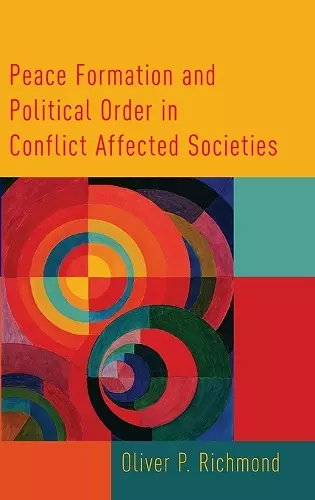Peace Formation and Political Order in Conflict Affected Societies
Format:Hardback
Publisher:Oxford University Press Inc
Published:14th Apr '16
Currently unavailable, and unfortunately no date known when it will be back
This hardback is available in another edition too:
- Paperback£34.49(9780190237646)

As Oliver Richmond explains, there is a level to peacemaking that operates in the realm of dialogue, declarations, symbols and rituals. But after all this pomp and circumstance is where the reality of security, development, politics, economics, identity, and culture figure in; conflict, cooperation, and reconciliation are at their most vivid at the local scale. Thus local peace operations are crucial to maintaining order on the ground even in the most violent contexts. However, as Richmond argues, such local capacity to build peace from the inside is generally left unrecognized, and it has been largely ignored in the policy and scholarly literature on peacebuilding. In Peace and Political Order, Richmond looks at peace processes as they scale up from local to transnational efforts to consider how to build a lasting and productive peace. He takes a comparative and expansive look at peace efforts in conflict situations in countries around the world to consider what local voices might suggest about the inadequacy of peace processes engineered at the international level. As well, he explores how local workers act to modify or resist peace processes headed by international NGOs, and to what degree local actors have enjoyed success in the peace process (and how they have affected the international peace process).
"When studying matters of peace and security, most of the practitioner and academic community trains its eye on states and other international actors. Richmond, though, challenges us to approach these matters from the ground up, and consider whether and how local actors are the key for understanding the transformation of conflict-ridden societies that have learned to develop a culture, practices, and institutions of nonviolent dispute resolution. A necessary corrective to standard treatments of peace and security." - Michael Barnett, University Professor of International Relations and Political Science, George Washington University "Who and what is peace for? Richmond's latest powerful critique interrogates the failure of peace and peacebuilding to engage with peace movements or protect the rights of populations. His answers challenge the statist, institutionalist and neoliberal conceptions of peace, and hail the tenacious local processes in which the formation of peace, and governing legitimacy reside." - Michael Pugh, Emeritus Professor, University of Bradford, and Visiting Professor, Radboud University Nijmegen "Oliver P. Richmond's remarkable study draws on a wide range of interesting empirical cases. The result is a thought-provoking and theoretically sophisticated monograph that breaks new ground in asking how an international system built by local peace actors might look." - Tarja Väyrynen, Professor of Peace and Conflict Research, Tampere Peace Research Institute
ISBN: 9780190237639
Dimensions: 160mm x 236mm x 20mm
Weight: 567g
264 pages